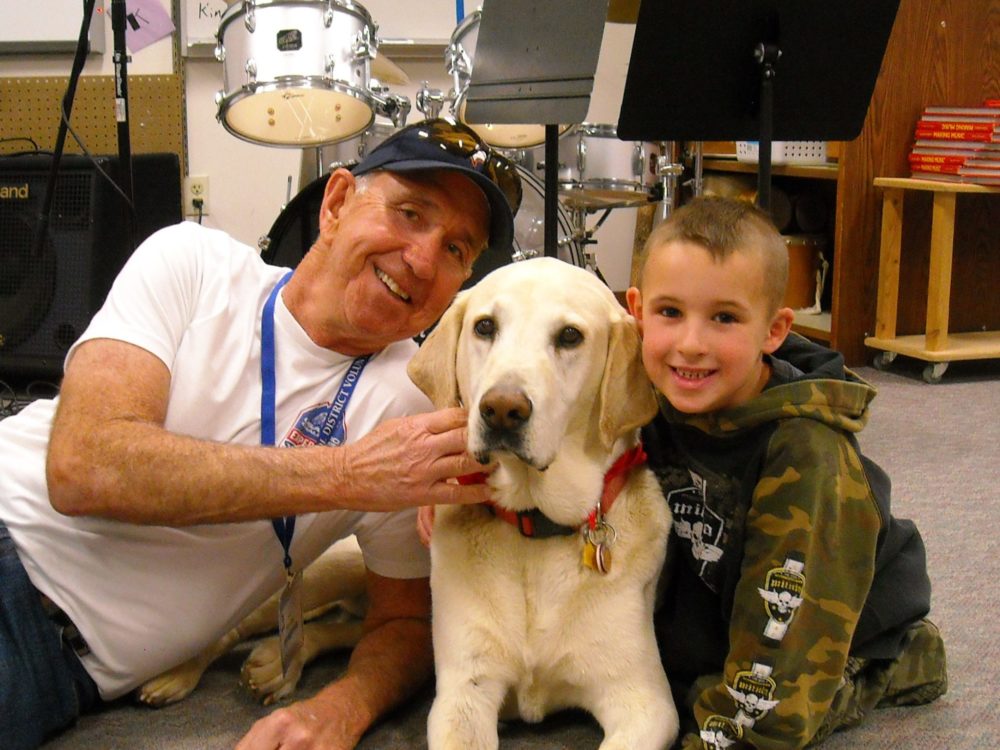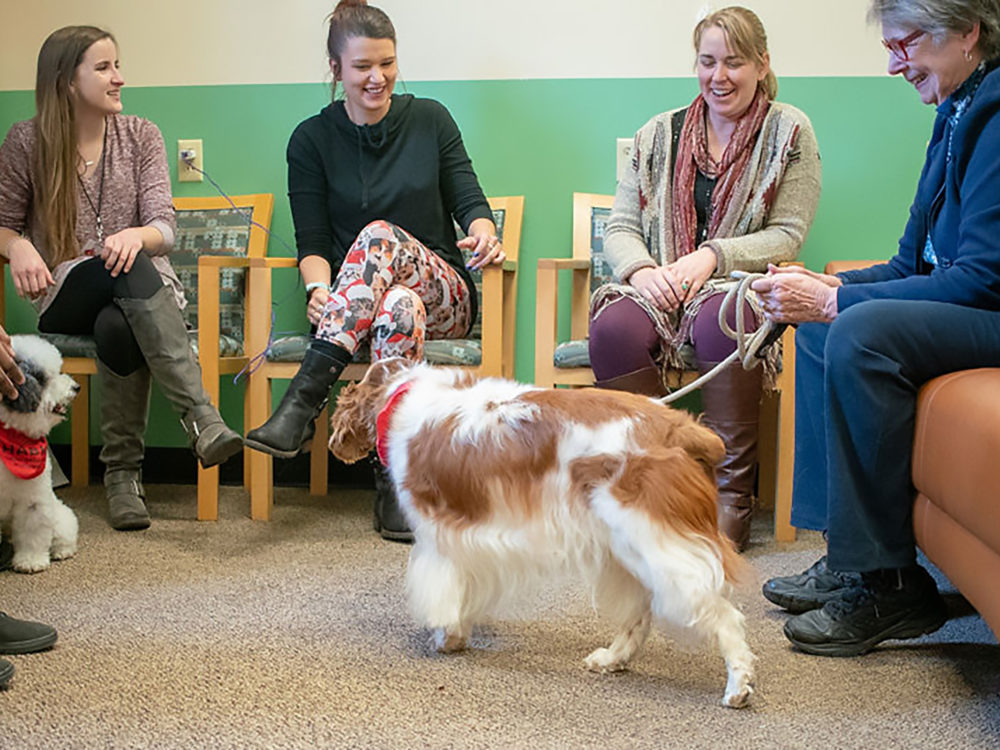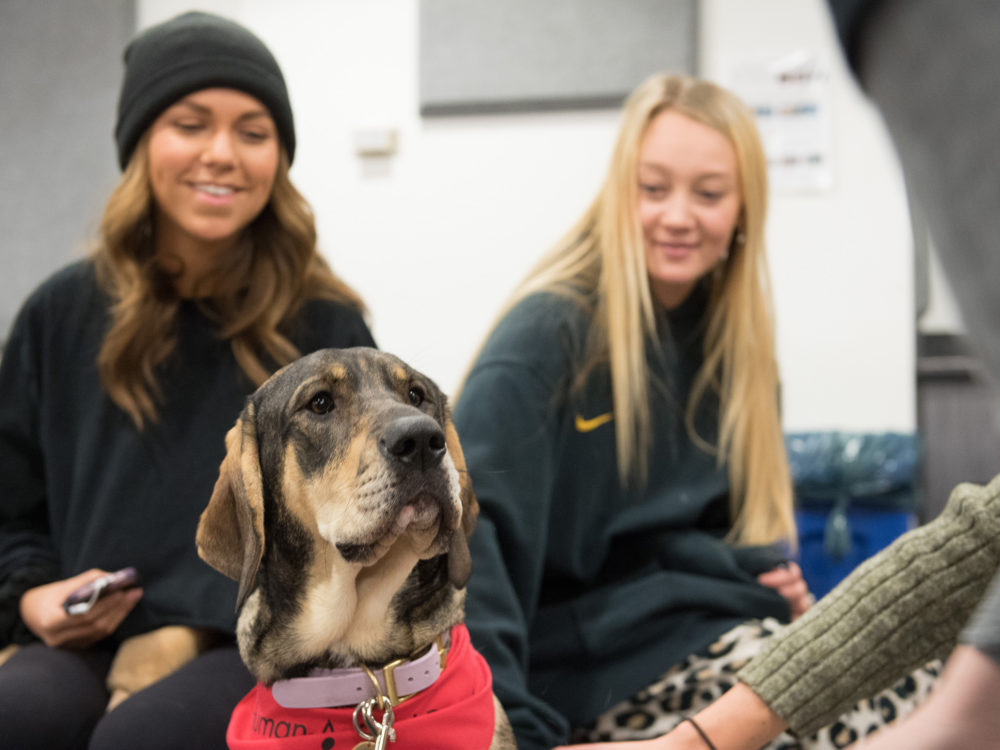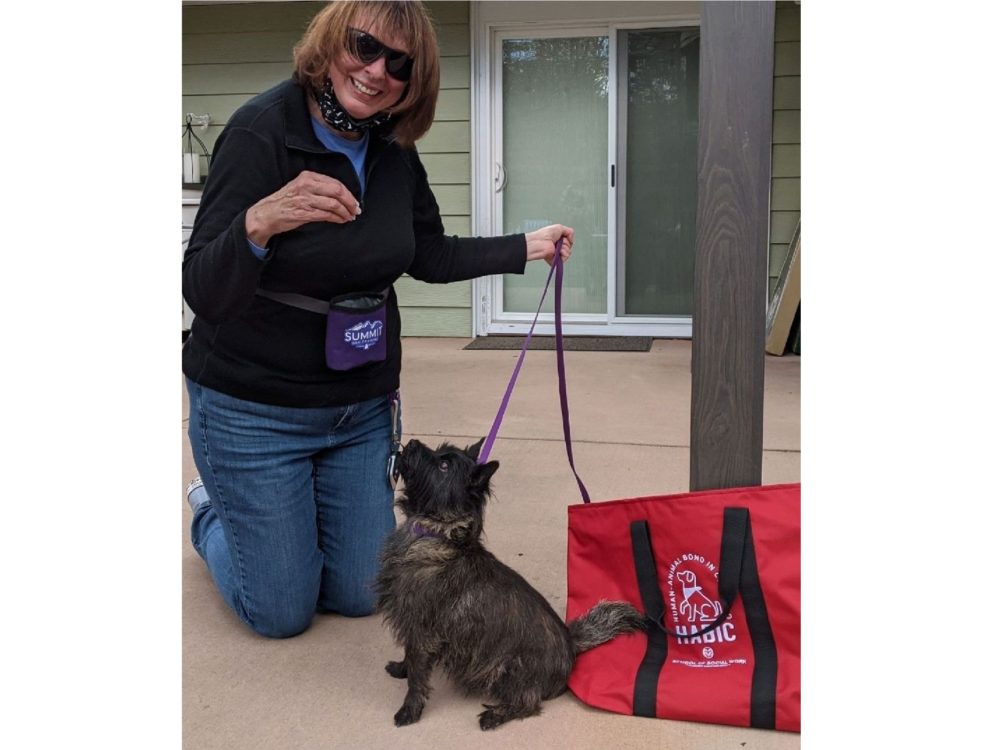Is volunteering as a therapy team with Human-Animal Bond in Colorado right for you?
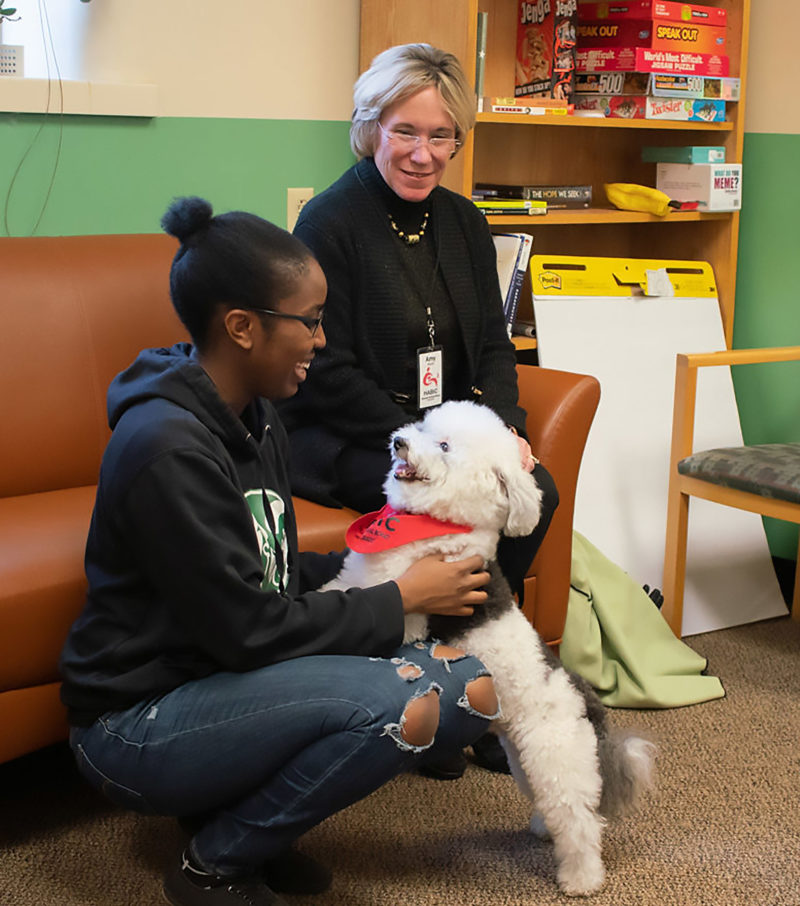
At HABIC, our volunteers receive training, peer support, and opportunities for continuing education. We empower our teams to advocate for their animal at all times.
HABIC requires each potential volunteer team to undergo a thorough screening and training process, to ensure those working with vulnerable individuals are well-prepared to act in an informed yet independent manner. Teams are placed with HABIC partner facilities and schools in Northern Colorado. Once teams are trained and placed in a volunteer assignment, a commitment of at least one year is expected. HABIC animal teams are asked to complete a re-evaluation every two years to maintain HABIC certification.
Therapy Dog Training Class
HABIC offers a hybrid 12-week therapy dog training class. Before joining, dog-handler teams must complete a group obedience class to establish a working relationship in a distracting environment. The class meets for one hour per week. Enrollment is ongoing.
The first two classes are entirely online and we learn about dog body language, subtle signs of stress, our training philosophy, and more. The remaining weeks are hybrid and consist of prerecorded training videos that you will watch before class. Then, we all meet together in-person to practice the skills from the videos. Upon successfully completing the class, you and your dog will sign up for a final evaluation to become a certified therapy team with HABIC.
Classes are offered year-round, with new cohorts starting approximately once a month.
Therapy Cat Training Class
Cats can make excellent therapy animals, providing comfort and support in various settings. HABIC’s Therapy Cat Class helps ensure your cat is well-prepared for this role. The program includes three 45-minute one-on-one sessions, during which we assess your cat’s behavior in a new environment, teach cat body language and handling skills, review key concepts, and conduct a temperament test. Enrollment is ongoing.
How to Enroll
To enroll in either class, watch the two information session videos and complete an application on our Volunteer Applications page. Contact HABIC Animal Trainer and Volunteer Coordinator Kate Miller with any questions!
Steps to becoming a therapy dog team
Assess your dog's suitability for therapy work
There are many things to consider when assessing an animal’s suitability for the demands of therapy work. Here are a few questions to ask yourself:
- Is my dog over 18 months old?
- Does my dog LOVE people?
- Is my dog dependable and trustworthy?
- Is my dog healthy?
- Is my dog house trained?
- Does my dog feel comfortable in new situations?
- Is my dog generally quiet (no excessive barking or whining) in public?
- Is my dog confident and easy-going?
- Is my dog friendly with other dogs?
- Is my dog polite when asking for attention?
- Would my dog be comfortable being groomed before every visit?
- Have I completed a group obedience training class with my dog?
You can also learn if therapy work is right for your dog by taking our Therapy Dog Quiz.
Attend a group obedience class in the community
It is a prerequisite to attend a group obedience class(es) in your local community. We recommend classes using positive reinforcement training methods. This ensures your dog has basic obedience skills and that you have a healthy working relationship with your dog, even when there are distractions. Upon completion of community classes, you and your dog should be able to do the following before beginning HABIC training:
-
- Your dog should know basic obedience cues, including sit, down, stay, and come. You should be comfortable giving your dog various cues.
- You and your dog should be able to work together in distracting environments, including with other dogs in the room. For this reason, be sure that at least one of the classes does not use blinds or visual barriers between dogs.
Watch two HABIC information sessions videos and complete a volunteer application
All prospective HABIC volunteers must watch two HABIC information session videos, and complete an application. The videos will allow you to learn more about HABIC, understand what our teams do, find out where our teams volunteer, and get your questions answered! Get started watching the Volunteer Information Sessions.
Complete HABIC's behavioral assessment
This behavioral evaluation session will help to determine how well you and your animal work together, and if your animal’s disposition is well-suited to being a therapy dog. This brief, informal evaluation will be conducted by the HABIC trainer, who will determine if you should proceed and which level of training you will attend.
Submit the HABIC medical form following completion by your animal’s veterinarian
Schedule an appointment with your veterinarian for the medical screening and have your veterinarian complete HABIC’s dog medical form or cat medical form, which must be submitted prior to the end of training. This form will serve as documentation that all vaccinations and requirements are up-to-date, and your animal is healthy and in good condition to work as a therapy animal.
Attend 12-week HABIC training program
HABIC offers a hybrid 12-week Therapy Dog Class. The class meets for one hour once a week. The first two classes are entirely online and we learn about dog body language, subtle signs of stress, our training philosophy, and more. The remaining weeks are hybrid and consist of prerecorded training videos that you will watch before class. Then, we all meet together in-person to practice the skills from the videos. Upon successfully completing the class, you and your dog will sign up for a final evaluation to become a certified therapy team with HABIC.
Classes are offered three times a year: Fall (classes begin in August), Spring (classes begin in late January/early February), and Summer (classes begin in May).
Pass the final evaluation for new HABIC teams
All HABIC volunteer teams must successfully complete a final evaluation at the end of their training classes. Everything that you practiced during classes will be evaluated in this final exam.
Re-evaluate every two years to maintain HABIC certification
Re-evaluation appointments allow active HABIC dog teams to maintain certification and have continued success in the areas of behavior, temperament, and skills. It also helps maintain the safety and effectiveness of therapy dog interactions. Finally, we love to re-connect with our teams and see how they’re doing!
Frequently asked questions
Does my dog need prior training for HABIC?
Yes, prospective therapy dog teams must complete a group obedience class prior to joining HABIC, to ensure the dog and handler have experience working in the presence of distractions.
How old does my dog have to be to join HABIC?
Dogs must be at least 18 months old before they can become a HABIC team.
Does my dog have to be a certain breed?
Definitely not. We welcome breeds of all shapes and sizes. The most important thing your dog needs is to love the work and be safe to use in volunteer settings.
Can my cat be in HABIC?
Yes! HABIC has certified therapy cat teams. Our cat teams bring a unique and calming presence to HABIC sessions.
What makes a good therapy cat?
Cats chosen for therapy roles should have a stable temperament, be comfortable with various people and environments, and be well-socialized. Here are some questions to consider:
- Is my cat over 18 months old?
- Does my cat LOVE people?
- Is my cat gregarious and outgoing, even in new environments?
- Is my cat healthy?
- Is my cat litter-box trained?
- Is my cat comfortable on car rides?
- Is my cat comfortable wearing a harness and leash?
- Do I have a secure way of transporting my cat, for example in a cat carrier, cat backpack, or cat stroller?
- Would my cat be comfortable being groomed before every visit? Including nail trims?
- Am I available to volunteer in the Northern Colorado area with my cat?
Is there a cost associated with being a HABIC team?
For new HABIC dog and cat teams, there is a fee for the therapy animal training classes. Scholarships are available. There are also veterinary medical requirements, such as a physical exam, fecal test, and current vaccines, which create additional costs. There is also a minimal cost for re-evaluation of existing teams to renew HABIC certification every two years. There is no cost to serve as a human-only volunteer.
HABIC training fees subsidize liability insurance for service as a HABIC volunteer. HABIC volunteer teams receive a 12-week training course, supplies, and support, for example, a HABIC tote bag, HABIC animal trading cards, personalized training assistance, administrative support, and opportunities for group support.
How long does it take to become a HABIC volunteer?
HABIC’s therapy dog training program takes about four months. HABIC’s therapy cat training program takes 2-3 months. Placements are dependent on needs and availability of facilities and volunteers. Human-only volunteers can begin volunteering as their schedule aligns with HABIC opportunities.
Where will I volunteer?
You and your animal will be matched in a placement upon completion of your certification. You will meet the contact person, tour the facility, and find out how HABIC teams interact with that facility’s population. You will also have the opportunity to observe an experienced HABIC team during a scheduled visit in your designated placement.
Volunteer stories
